Key Areas
Student Development and Enrollment Management
From the first closure, following the October 17 Revolution, SDEM worked toward shifting all its services online, avoiding any disruption for the students.
The SDEM unit pulled out all the stops to continue providing students with the support they needed in navigating a difficult year and addressing prospective students’ queries. It also conducted successful digital and social recruitment campaigns to preclude a slump in enrollment due to students’ financial difficulties.
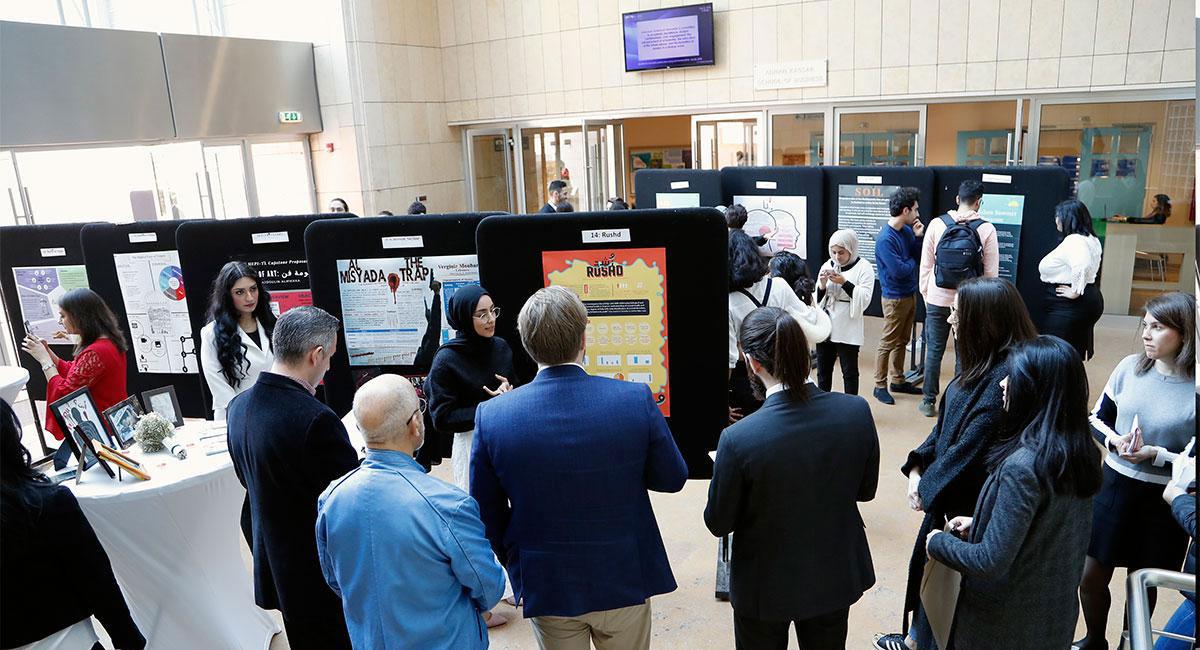
During AY2019-2020 LAU MEPI-Tomorrow’s Leaders (LAU MEPI-TL) received a grant of $10 million from US-Middle East Partnership Initiative (MEPI) for a new Tomorrow’s Leaders Gender Scholars (TLS) Program to strengthen undergraduate student awareness, preparedness and skills in gender education and activism.
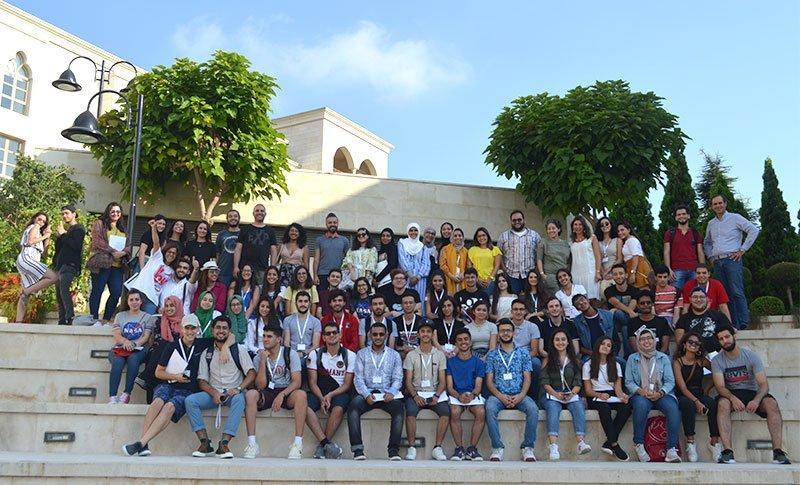
In September 2019, administrators of the US-Middle East Partnership Initiative Tomorrow’s Leaders Program (MEPI-TL) organized a two-day retreat for more than 80 students - new and old cohorts - program advisors and instructors. During the retreat, students received leadership training, and learned about academic projections for AY2019-2020, the program’s objectives, and their roles and responsibilities.
During the lockdown periods, no less than 85 tutoring sessions on both campuses, organized by academic advisors in coordination with chairpersons and courses instructors, were delivered online via WebEx or Zoom.
In addition to assistance online, academic advisors provided support and guidance to students through phone calls and emails, and delivered several virtual workshops such as Note Taking, How to Choose a Minor, Time Management and Study Skills, etc.
The Career Services Offices in Beirut and Byblos took on the unemployment challenge that the country has been facing over the last few months by partnering with JobTeaser, an international placement platform that allowed students and alumni to apply for job and internship opportunities worldwide. Since its launch, more than 2,300 LAU students and alumni have benefited from the services it offers, from placement opportunities to career events, workshops, and diverse resources. Career services also collaborated with JobsforLebanon, a Lebanese global recruiting platform where the Lebanese diaspora post freelance and full-time opportunities for the Lebanese talent.
Online career advising also took the form of job and internships postings, career advising sessions, résumé writing sessions, Strong Interest Inventory assessment and interpretation sessions to help students choose the right major, in addition to professional development workshops such as CV Writing, Job Search Strategies, Career Exploration, and LinkedIn Profile, among others.
The Counseling Office used a variety of online platforms such as WebEx, Zoom, and Skype, to support students, especially with the added stress brought about by COVID-19 and the socioeconomic situation in the country. Students who feel restricted to talk freely at home or who simply feel more comfortable expressing themselves in writing were offered the option of “typing” using the chat windows of the online platform in use, rather than talking. Counselors made themselves available for after-hour services and extended their working hours over the weekend to cater to the large number of students requesting appointments.
An Orientation One-Stop Page was created where students can find all essential information about the different schools, majors, offices, services and facilities. Offices and schools also provided short videos to explain about the departments, majors and schools.
Tackling the COVID-19 pandemic, the Health Services Office launched the telehealth consultations system using secure audio/visual communications, to provide health advice as well as wellness services to the LAU community. This service was provided using the WebEx platform, WhatsApp calls and video calls through a mobile number allocated by LAU, and through emails queries as usual. Strict safety protocols and safety procedures were also imposed in the dorms.
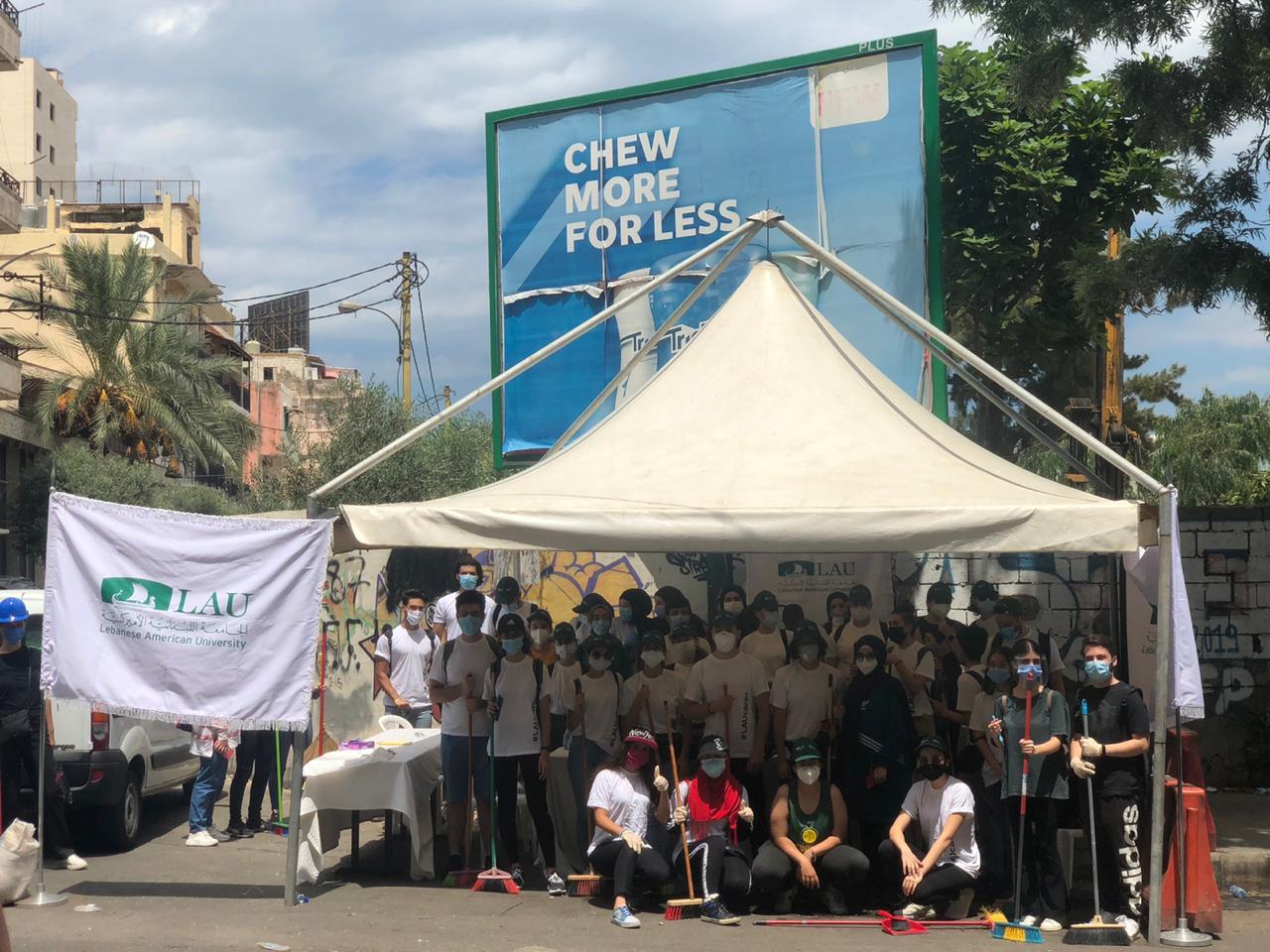 In response to the devastation wrought on thousands of homes by the August 4 explosion, students from across the schools mobilized to help clear up debris and cover broken windows and doors and distribute food in some of Beirut’s hardest-hit neighborhoods. A student-led Servants of Society campaign, launched by the Outreach and Civic Engagement Department, set out to offer assistance where it was needed: collecting and distributing in-kind donations, cleaning up the streets and homes in Beirut and connecting people with therapists for psychological support.
In response to the devastation wrought on thousands of homes by the August 4 explosion, students from across the schools mobilized to help clear up debris and cover broken windows and doors and distribute food in some of Beirut’s hardest-hit neighborhoods. A student-led Servants of Society campaign, launched by the Outreach and Civic Engagement Department, set out to offer assistance where it was needed: collecting and distributing in-kind donations, cleaning up the streets and homes in Beirut and connecting people with therapists for psychological support.
Institutes and Centers
The Arab Institute for Women
The AiW secured funding from the Institute of Development Studies for a four-year project titled “Countering Backlash: Reclaiming Gender Justice.”
The AiW won an award from UN Women and WHO for a project - in collaboration with the Global Women’s Institute (GWI) at the George Washington University - to create a regional initiative to build Arab capacity to research violence against women. This was a highly competitive process and will lead to further collaborations with UN Women - an important strategic partner.
In collaboration with LAU’s Continuing Education, the institute received another grant to develop courses focused on Women, Peace, and Security that make up part of the Gender in Development and Humanitarian Assistance (GDHA) certificate.
The AiW also launched a new project that aims to enhance the capacities of female activists, human rights advocates, media professionals, and bloggers working on gender issues in the Arab region, and specifically in Lebanon. This initiative, in collaboration with the Arab Institute for Human Rights and funded by the Embassy of Canada in Lebanon, is a one-year project that entails conducting two regional online training courses.
The Center for Innovative Learning
The Center for Innovative Learning (CIL) played a pivotal role in the transition to online learning, providing individual as well as group support to faculty since the onset of the pandemic. The CIL held various webinars on effective digital teaching and learning tools, tackling issues such as hybrid education, sustaining student engagement online, remote testing and assessment, and maximizing the use of resources, among many others.
In its mission to bring together colleagues from different schools and disciplines to promote university-wide excellence in teaching, learning, and assessment through innovation, educational technologies and high impact pedagogies, the CIL also sent out calls for proposals as part of its annual Faculty Fellows Program. Given the current needs, the proposals focused on online and hybrid learning and teaching.
The Center for Lebanese Heritage
Undeterred by the lockdowns and unforeseen events, the Center for Lebanese Heritage under the direction of Henri Zoghaib continued to promote the country’s tangible and intangible heritage. Adapting to the new normal, the center held no less than 14 webinars on a wide range of topics, such as history, literature and music during AY2019-2020.
The Centre for Lebanese Studies
In partnership with several local NGOs and activists as well as academics from Oxford Brookes University, the Centre for Lebanese Studies created a Disability Research and Advocacy Hub to raise awareness on disability and enable informed policies and advocacy interventions related to disability issues in the Arab World, for better quality of life of Persons with Disabilities.
In addition, the center has launched a series of workshops alongside the University of Birmingham, Birmingham City University and Birzeit University to investigate and prioritize research needs across Lebanon, Jordan and Palestine, as part of the Disability Under Siege Project, an international network led by the University of Birmingham and funded by the Global Challenges Research Fund.
The Fouad Makhzoumi Innovation Center
Toward the end of the fall semester, the Fouad Makhzoumi Innovation Center launched the LAU Spark Program that offers training and workshops to selected applicants and prepares them to pitch their ideas to the LAU Investment Committee and earn the pre-seed fund of $5,000 to further develop their idea into a prototype or demo. Successful participants can then pitch their ideas to investors and start their commercial journey.
Out of 29 applications from interested students/staff/Alumni teams/startups wanting to participate in the program, the nine teams selected underwent a five-day bootcamp followed by workshops related to Business planning, Financials, Marketing, presentation skills, pitching and more.
LAU Louis Cardahi Foundation
The LAU Louis Cardahi Foundation, whose director Dr. Rachid Chamoun is also the president of the Phoenicians’ Route, held several webinars in collaboration with the Phoenicians’ Route and the Lebanese Tour Guides Syndicate.
From topics on archeology, architecture, tourism history, Phoenician foreign policies and language, the webinars hosted local and international experts in their fields.
University Administration
Any disruption to the running of the university and the academic year was averted by the hard work of the Department of Institutional Research and Assessment, Human Resources, Information Technology and Facilities Management.
With standardized tests such as the SAT put on hold during the pandemic, the Department of Institutional Research and Assessment (DIRA) coordinated with Dean of Arts and Sciences, Dr. Cathia Jenainati and colleagues from the Department of English to revise its English Entrance Exam (EEE) developed internally. Throughout AY2019-2020, DIRA also kept up its support of the university by providing all institutional information for rankings and accreditation, carrying out assessments and publishing key reports including Facts & Figures and the annual Fact Book.
As staff and faculty operated from home during lockdowns, Human Resources ensured that they receive all updates on closures and attendance modes. HR staff were on hand to handle queries and diligently processed payments and benefits in a potentially disruptive environment.
IT seamlessly managed the shift to online learning, having started with the project of distance learning deployed for classes between Byblos and Beirut campuses, integrated Cisco WebEx with their multimedia systems, and facilitated recording online lectures on blackboard. IT staff responded in a timely manner to the vast number of requests in the first few weeks of the lockdown, helping faculty with programs like Cisco WebEx and Panopto, and installing VPNs for clients who were working remotely. Another solution provided to all full-time faculty and staff was the OneDrive cloud for sharing files with their team members and students.
Following the outbreak of COVID-19, Facilities Management took all the necessary measures to ensure physical distancing guidelines are implemented on both campuses in line with the recommendations of the university’s Emergency Health Response Committee. Academic spaces, public and common areas were set up accordingly to ensure a safe return to campus activities. Though work was intermittent in observance of lockdowns, renovations of the Gulbenkian Theater progressed and those of the Gezairi building have advanced considerably.
University Enterprise Office
As LAU’s strategic consultancy entrepreneurial development and programs management arm, the University Enterprise Office - of which LAU Consult is a crucial component - spent AY2019-2020 exploring entrepreneurial venues in which to expand LAU’s educational mission, both in Lebanon and MENA region. This included focusing on potential academic partnerships, consultancies and other relationships.
University Advancement
Development Office
The end of AY2019-20 saw LAU set a fine example in crisis management, shift much-needed resources from the operating budget to student support, and defer and put on hold most capital projects.
As soon as the economic crisis hit, LAU implemented a series of steps to help alleviate the financial burden the economic crisis placed on students and parents. Raising the financial aid target to $50 million for the AY2019-2020 academic year to assist 65 percent of its students, LAU set up the Emergency Financial Aid Fund in December 2019.
By July 2020, as faculty, staff, alumni, and friends of LAU rallied behind the fund, the donations raised covered approximately 44 scholarships.
The Development Office (DO) redoubled its efforts in the second phase of the Emergency Financial Aid Fund to raise funds for 250 partial scholarships by September 30, 2020, each partial scholarship representing $10,000 and covering, on average, half of a student’s annual tuition.
With the outbreak of COVID-19, the university launched the COVID-19 Emergency Fund to assist the LAU Medical Center-Rizk Hospital in its fight against the pandemic.
Advancement Services
Gift stewardship and donor reports continued uninterrupted, mostly through a realignment of donor communications using online channels.
Strategic Communications Department
Continual campus closures caused by the October 19 Uprising and the surge of COVID-19 placed the onus on the Strategic Communications Department (Stratcom) to keep its faculty, students, staff and the wider LAU community informed.
Shortly after the start of the academic year, Stratcom sought the LAU faculty’s assessment of the revolution to produce the first-ever supplement to its LAU Magazine and Alumni Bulletin.
As the world began to reckon with the uncertainty of the COVID-19 pandemic, Stratcom launched the COVID-19 website, and an internal newsletter LAU Now designed to reconnect the LAU community virtually.
In addition, the department executed several direct marketing campaigns for schools and divisions, produced special videos for the Emergency Financial Aid Fund, among others, awareness posters and leaflets on COVID-19.
Alumni Relations Office
The Alumni Relations Office was as instrumental as ever in fundraising campaigns, which, in the current economic crisis were central to the university’s survival.
At the same time, the office carried on hosting - albeit virtually after the outbreak of COVID-19 - its popular talks addressing timely topics by experts in their field:
In October 2019 alumnus and Clinical Psychiatrist/ Adult Psychotherapist Wael Salameh was invited to lead a Stay Aware Alumni Lecture on Understanding Major Depressive Disorder. And then again, in February 6, 2020 Dr. Salameh delivered a Keep Learning Alumni Lecture on Who You Are is How You Lead.
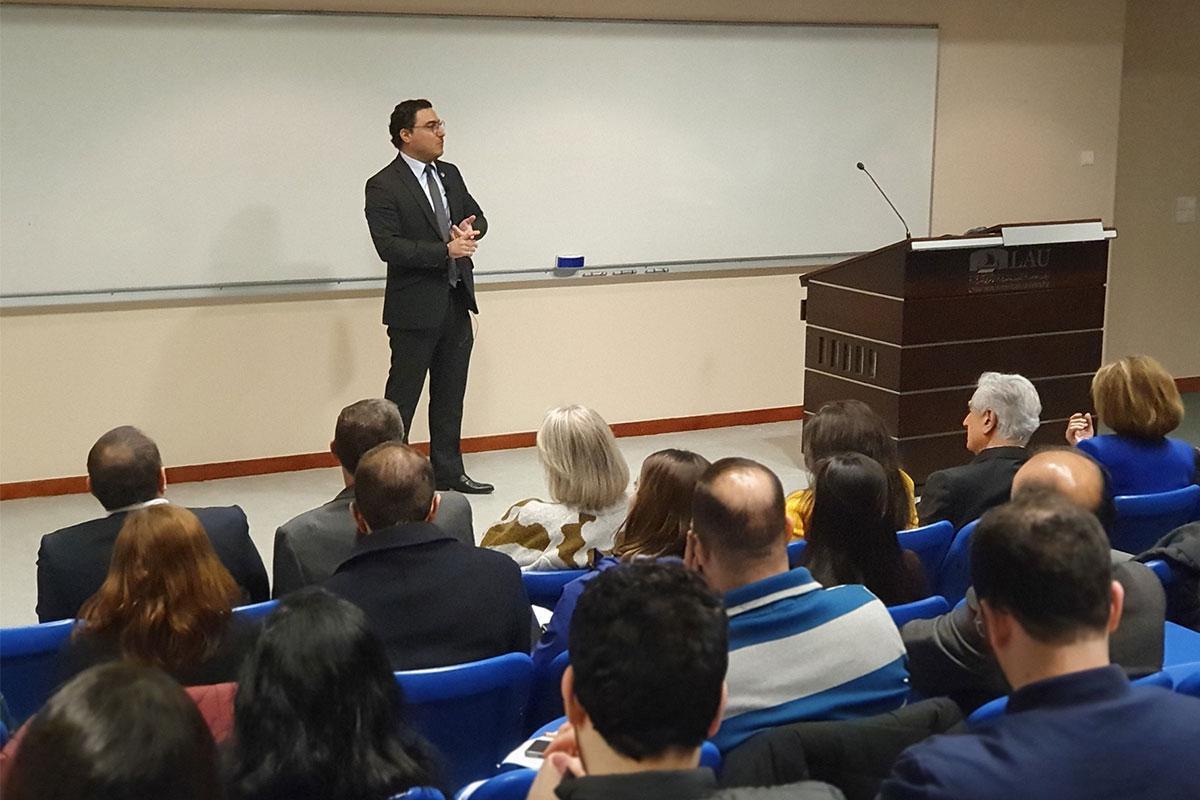 With the many crises crippling the country, a Keep Learning lecture by alumnus and former Member of the Board of Trustees Fouad Zmokhol on Crisis Management drew a full house.
With the many crises crippling the country, a Keep Learning lecture by alumnus and former Member of the Board of Trustees Fouad Zmokhol on Crisis Management drew a full house.
In addition to the many alumni whose achievements are mentioned in the respective schools, renowned artist Mona Hatoum (‘72) received the prestigious Japanese Praemium Imperiale Award, dubbed the Nobel Prize of Arts, for her lifetime achievement in sculpture. Hatoum was presented with the award by Prince Hitachi, honorary patron of the Japan Art Association, in a ceremony held in Tokyo in October 2019.
LAU New York Headquarters and Academic Center
In 2019, critical positions at LAU New York Headquarters and Academic center were filled by Nadim Shehadi who took over as executive director of the academic center and by Nadya Mikdashi as the assistant vice president of Development for LAU NY. Prior to joining LAU, Shehadi was the director of the Fares Center for Eastern Mediterranean Studies at The Fletcher School of Law and Diplomacy, Tufts University, and Mikdashi a co-founder of Skoun Lebanese Addiction Center, a non-profit that has pioneered community-based treatment for substance abuse and evidence-based drug education in Lebanon.
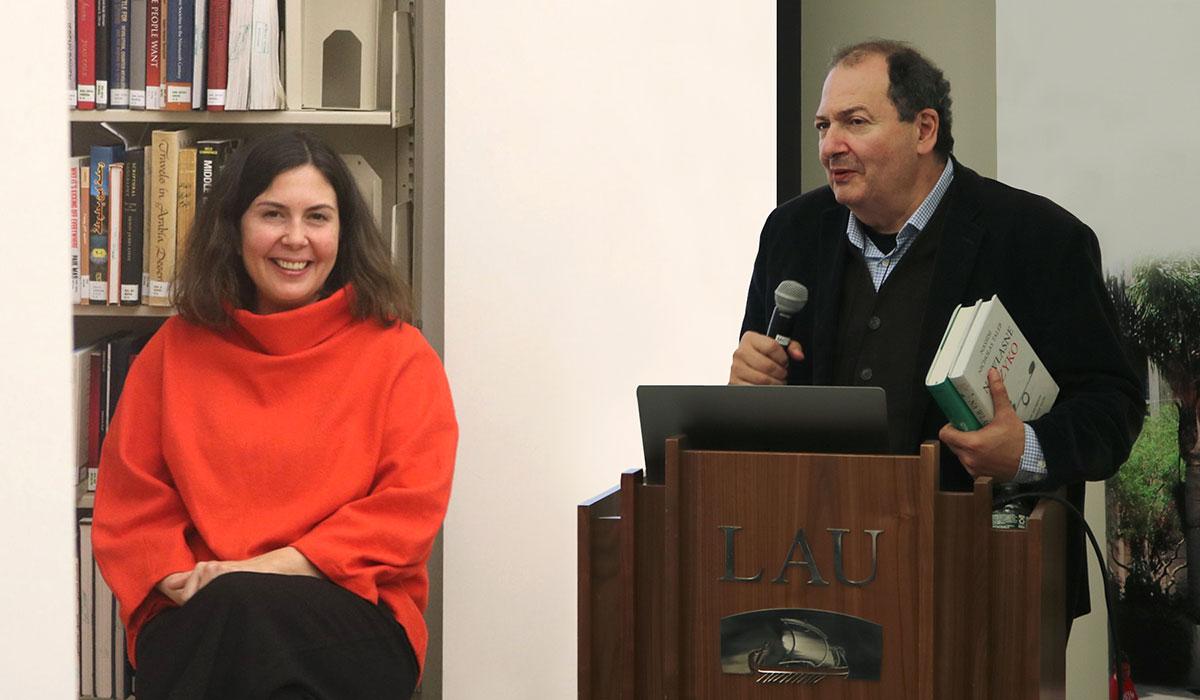 Through various through-provoking conferences and webinars hosted by Shehadi and featuring well-known scholars, authors, political thinkers, and others on current issues in Lebanon and worldwide, the center is fast becoming an ideas hub that serves both the Middle East and the United States.
Through various through-provoking conferences and webinars hosted by Shehadi and featuring well-known scholars, authors, political thinkers, and others on current issues in Lebanon and worldwide, the center is fast becoming an ideas hub that serves both the Middle East and the United States.
On the Development front, under the leadership of Mikdashi, the center assumed a pivotal role in complementing the fundraising efforts of the development office in Beirut.
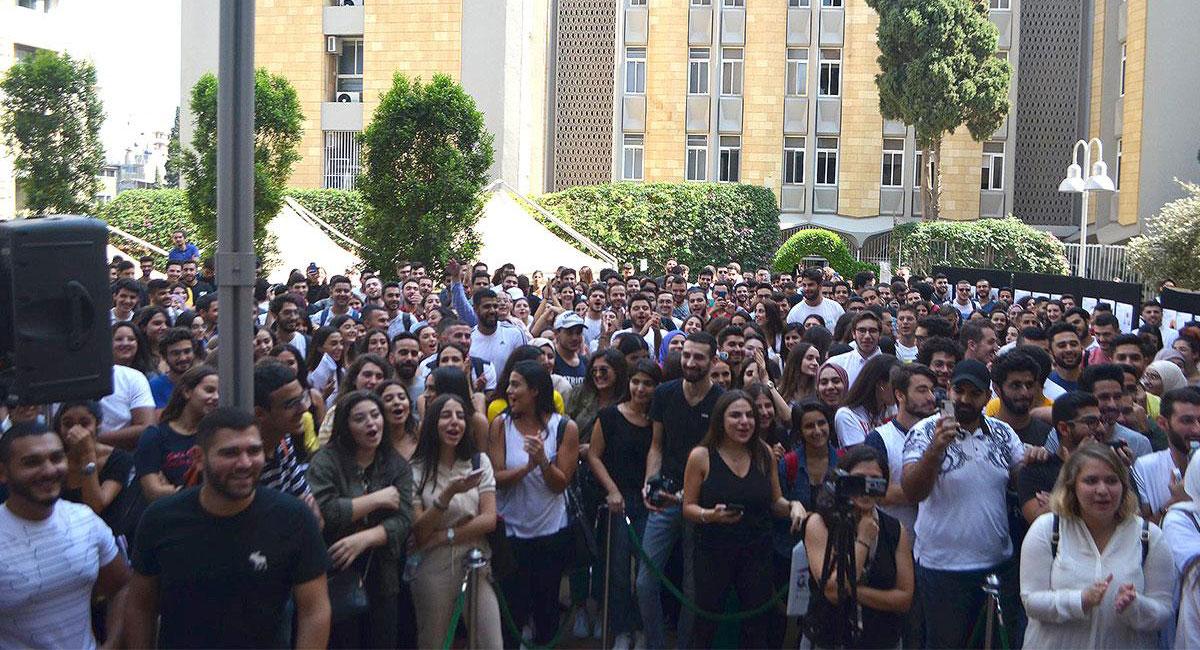
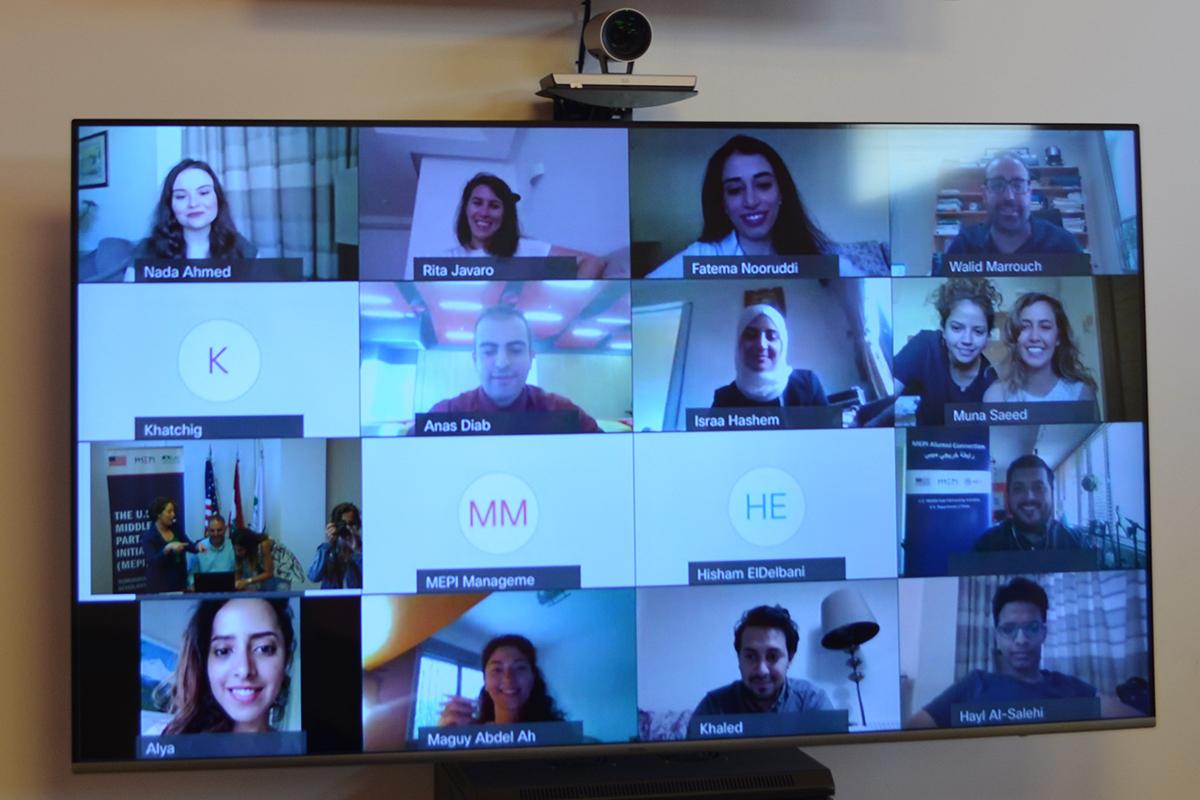
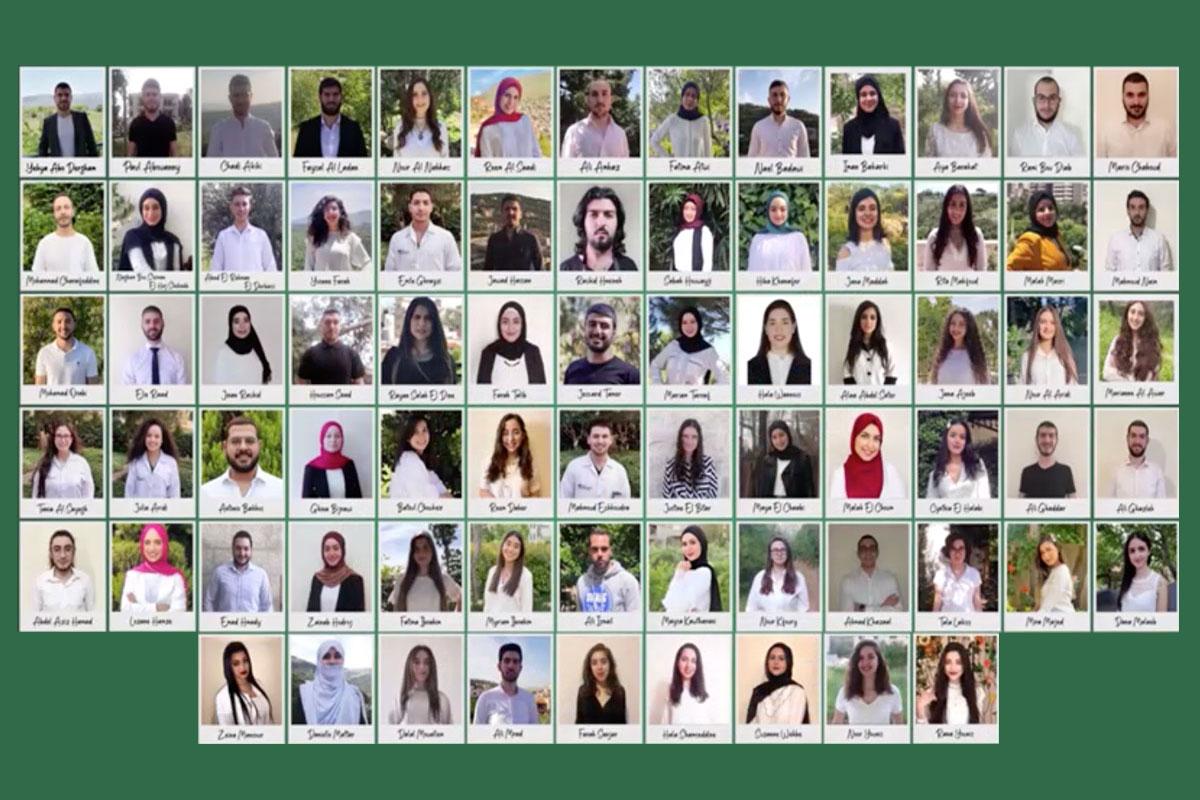
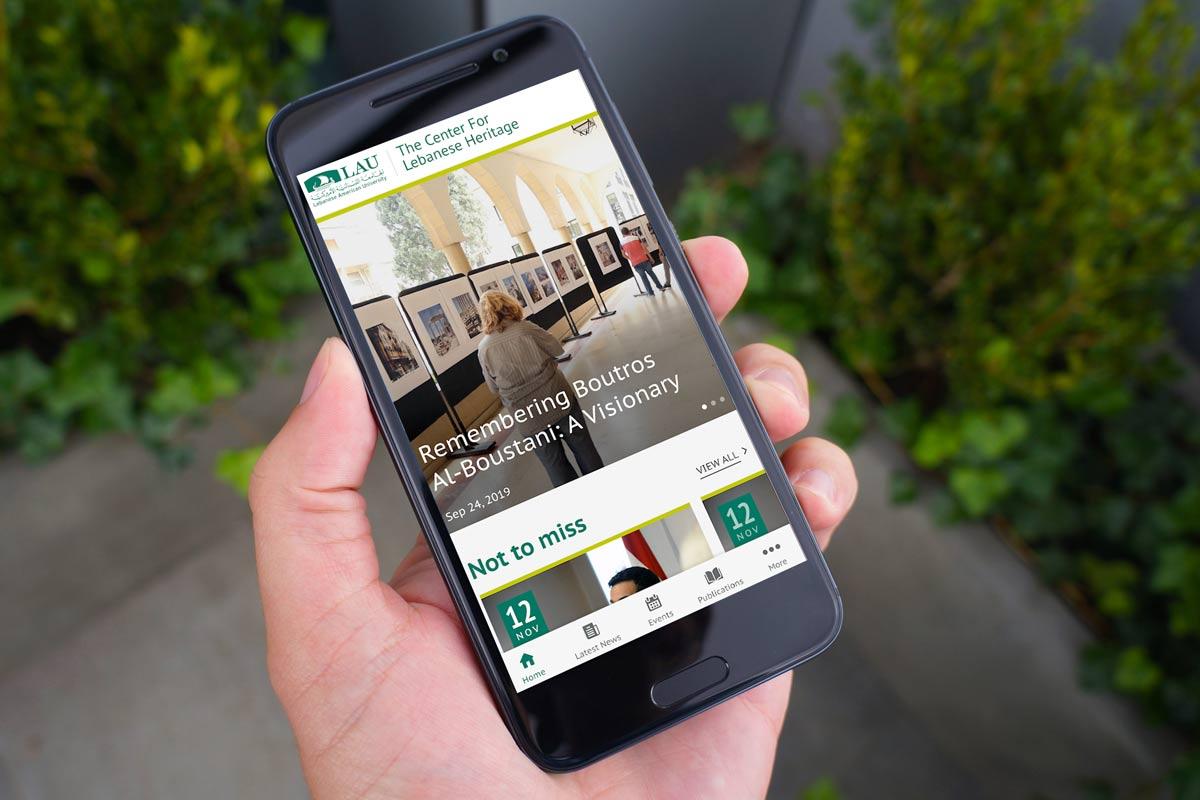
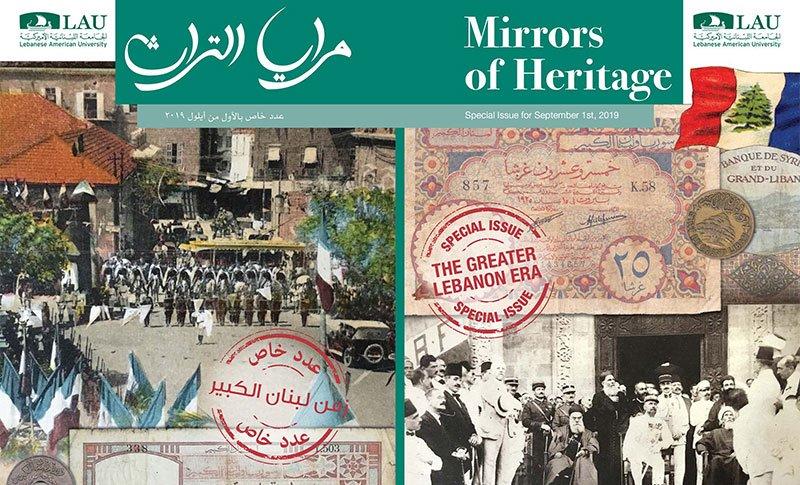

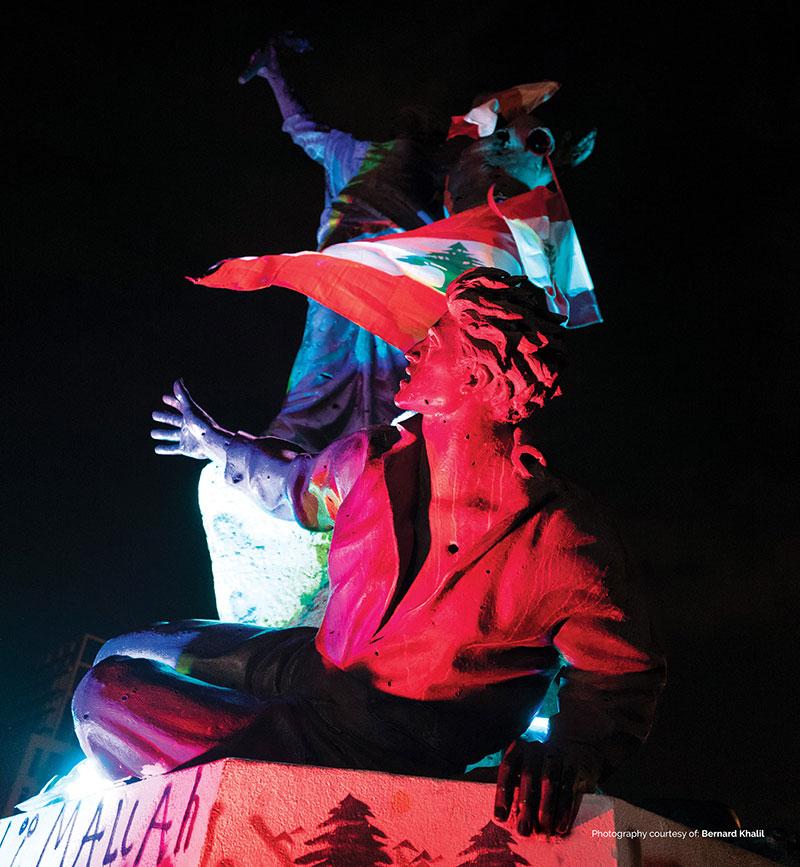 October 17 Uprising: An Academic Perspective
October 17 Uprising: An Academic Perspective